Postgraduate Teacher Development and Supervision Assignment, 2017/2018
VerifiedAdded on 2023/06/09
|18
|3786
|288
Homework Assignment
AI Summary
This assignment is a comprehensive exploration of teacher development, encompassing various models of Second Language Teacher Education, including the Applied Science, Craft, and Reflective models. It argues for the suitability of the reflective model in the 21st century, emphasizing its focus on decision-making and individual learning theories. The assignment also analyzes Tsui's three main phases of teacher professional development and explores the contributory factors shaping the process, such as social environment, personal experiences, and organizational influences. Furthermore, it includes a reflection on Marina's professional journey, from novice to expert, and discusses the importance of teachers as lifelong learners and agents of change in the modern era, particularly within the context of increasing diversity and technological advancements in education. The assignment concludes by highlighting the need for continuous professional development and the role of schools and governments in supporting teachers to enhance student learning.
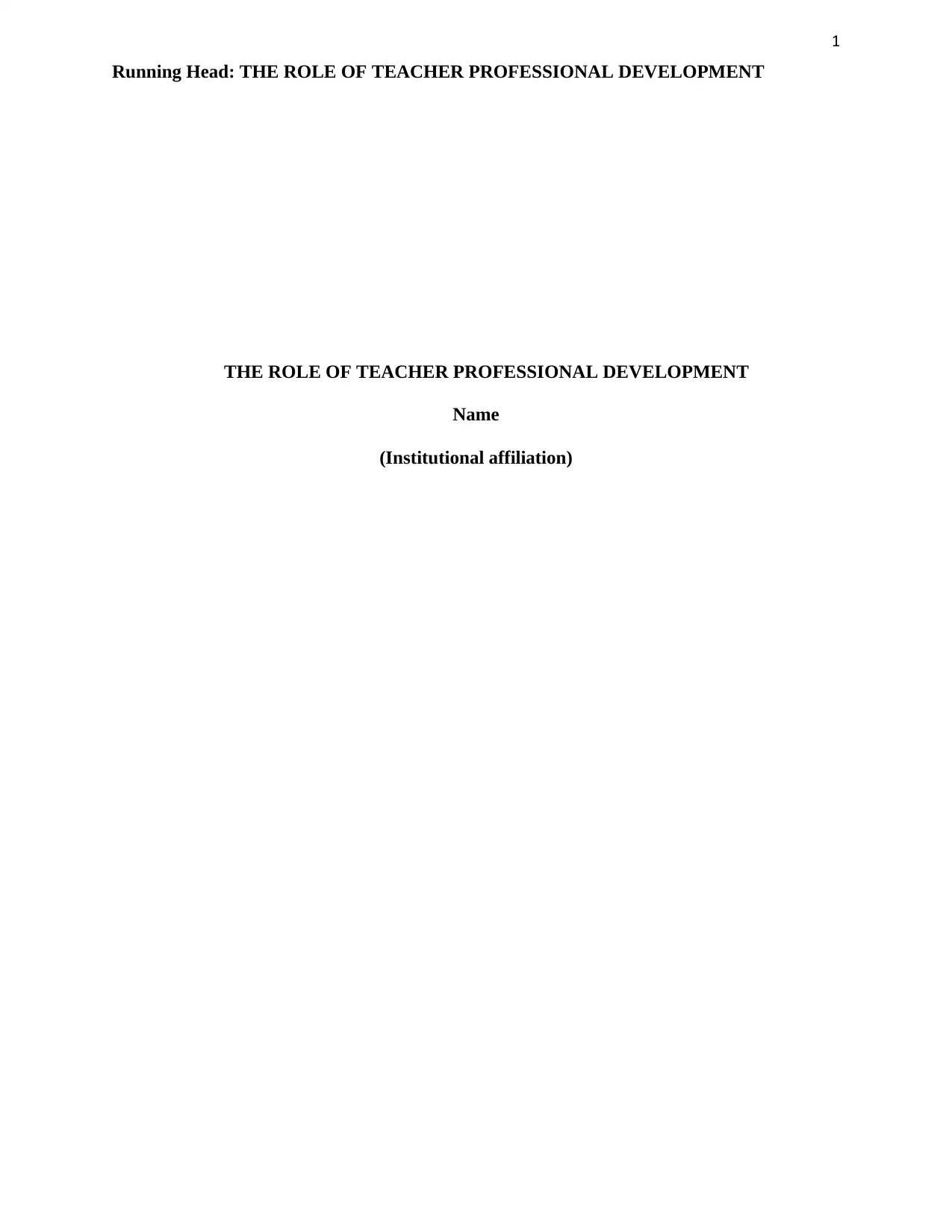
1
Running Head: THE ROLE OF TEACHER PROFESSIONAL DEVELOPMENT
THE ROLE OF TEACHER PROFESSIONAL DEVELOPMENT
Name
(Institutional affiliation)
Running Head: THE ROLE OF TEACHER PROFESSIONAL DEVELOPMENT
THE ROLE OF TEACHER PROFESSIONAL DEVELOPMENT
Name
(Institutional affiliation)
Paraphrase This Document
Need a fresh take? Get an instant paraphrase of this document with our AI Paraphraser
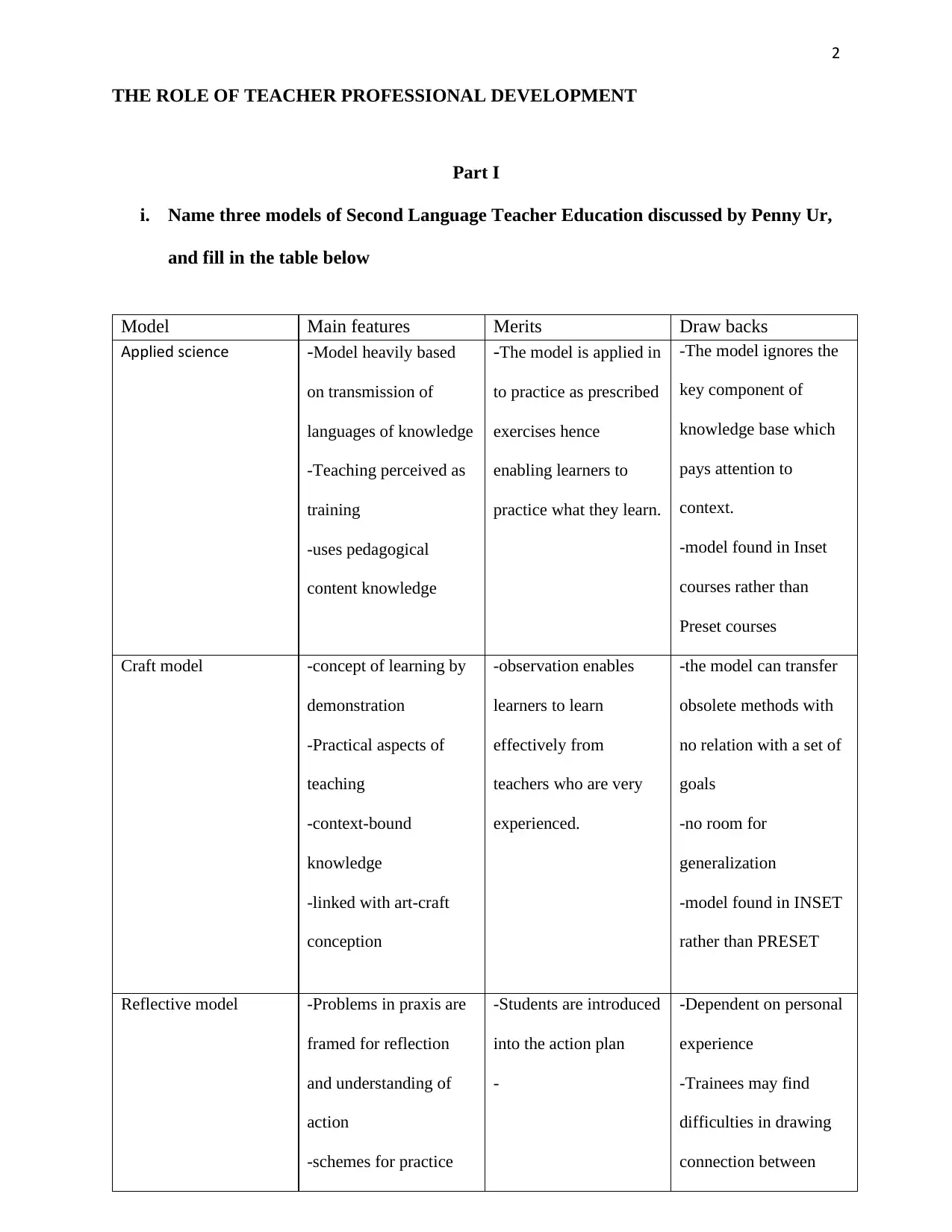
2
THE ROLE OF TEACHER PROFESSIONAL DEVELOPMENT
Part I
i. Name three models of Second Language Teacher Education discussed by Penny Ur,
and fill in the table below
Model Main features Merits Draw backs
Applied science -Model heavily based
on transmission of
languages of knowledge
-Teaching perceived as
training
-uses pedagogical
content knowledge
-The model is applied in
to practice as prescribed
exercises hence
enabling learners to
practice what they learn.
-The model ignores the
key component of
knowledge base which
pays attention to
context.
-model found in Inset
courses rather than
Preset courses
Craft model -concept of learning by
demonstration
-Practical aspects of
teaching
-context-bound
knowledge
-linked with art-craft
conception
-observation enables
learners to learn
effectively from
teachers who are very
experienced.
-the model can transfer
obsolete methods with
no relation with a set of
goals
-no room for
generalization
-model found in INSET
rather than PRESET
Reflective model -Problems in praxis are
framed for reflection
and understanding of
action
-schemes for practice
-Students are introduced
into the action plan
-
-Dependent on personal
experience
-Trainees may find
difficulties in drawing
connection between
THE ROLE OF TEACHER PROFESSIONAL DEVELOPMENT
Part I
i. Name three models of Second Language Teacher Education discussed by Penny Ur,
and fill in the table below
Model Main features Merits Draw backs
Applied science -Model heavily based
on transmission of
languages of knowledge
-Teaching perceived as
training
-uses pedagogical
content knowledge
-The model is applied in
to practice as prescribed
exercises hence
enabling learners to
practice what they learn.
-The model ignores the
key component of
knowledge base which
pays attention to
context.
-model found in Inset
courses rather than
Preset courses
Craft model -concept of learning by
demonstration
-Practical aspects of
teaching
-context-bound
knowledge
-linked with art-craft
conception
-observation enables
learners to learn
effectively from
teachers who are very
experienced.
-the model can transfer
obsolete methods with
no relation with a set of
goals
-no room for
generalization
-model found in INSET
rather than PRESET
Reflective model -Problems in praxis are
framed for reflection
and understanding of
action
-schemes for practice
-Students are introduced
into the action plan
-
-Dependent on personal
experience
-Trainees may find
difficulties in drawing
connection between
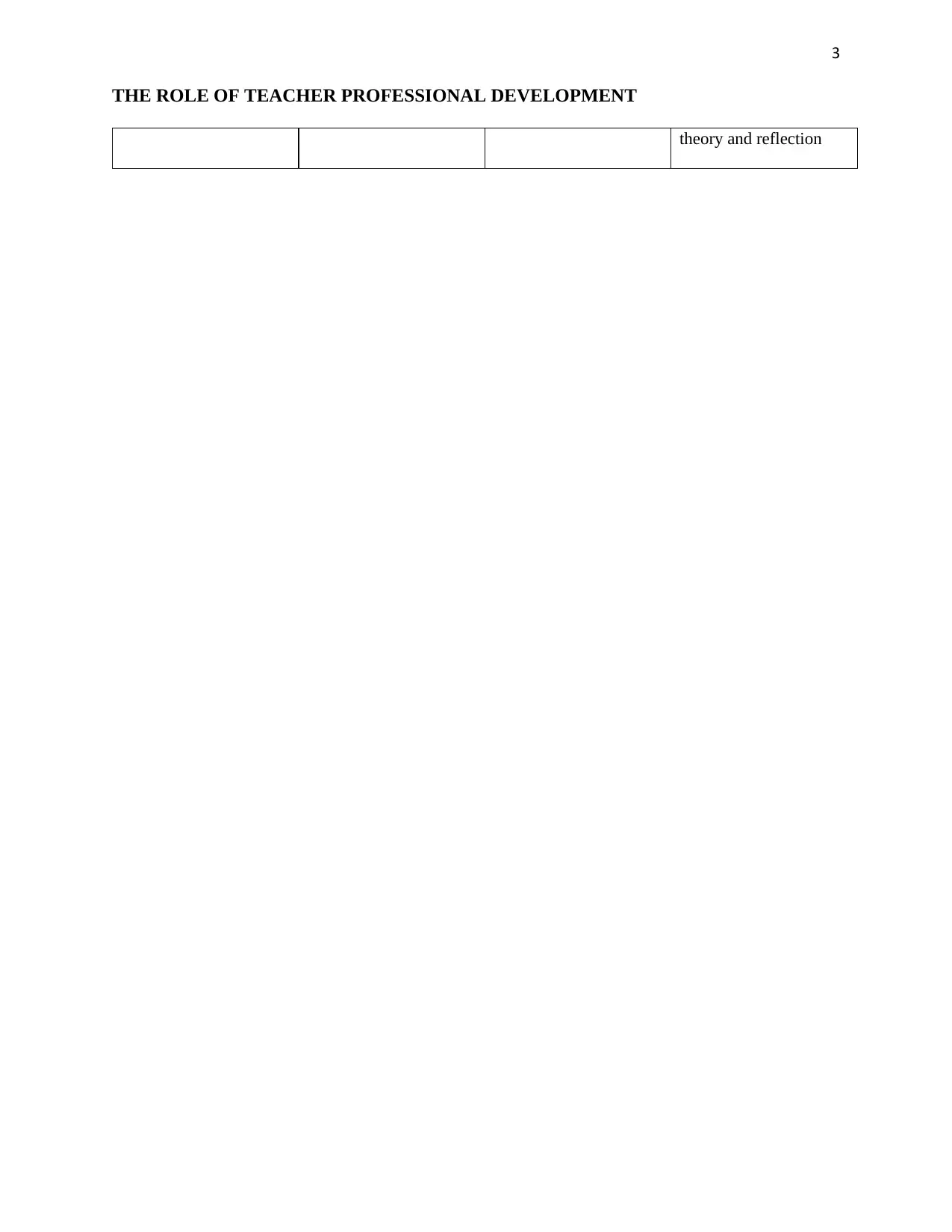
3
THE ROLE OF TEACHER PROFESSIONAL DEVELOPMENT
theory and reflection
THE ROLE OF TEACHER PROFESSIONAL DEVELOPMENT
theory and reflection
⊘ This is a preview!⊘
Do you want full access?
Subscribe today to unlock all pages.

Trusted by 1+ million students worldwide
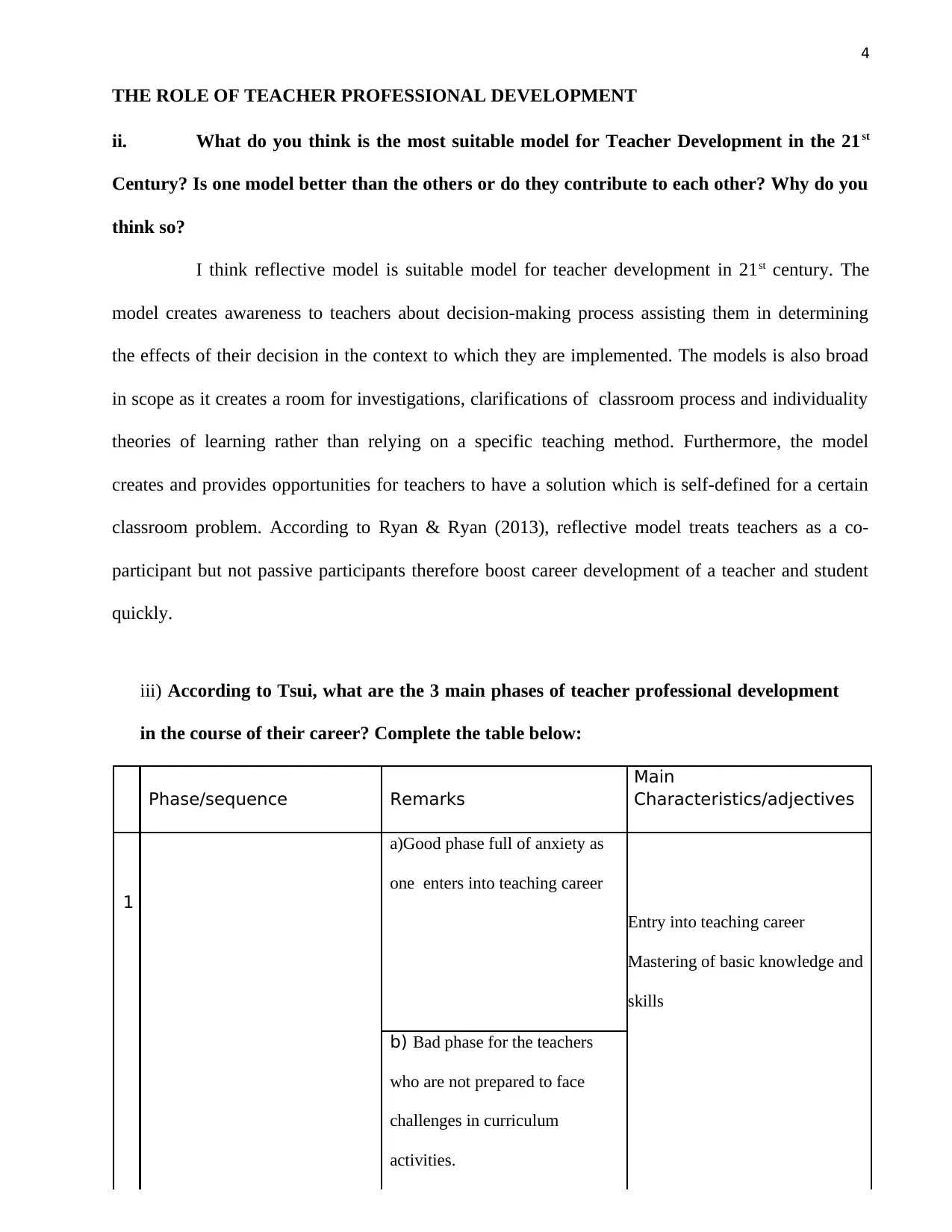
4
THE ROLE OF TEACHER PROFESSIONAL DEVELOPMENT
ii. What do you think is the most suitable model for Teacher Development in the 21st
Century? Is one model better than the others or do they contribute to each other? Why do you
think so?
I think reflective model is suitable model for teacher development in 21st century. The
model creates awareness to teachers about decision-making process assisting them in determining
the effects of their decision in the context to which they are implemented. The models is also broad
in scope as it creates a room for investigations, clarifications of classroom process and individuality
theories of learning rather than relying on a specific teaching method. Furthermore, the model
creates and provides opportunities for teachers to have a solution which is self-defined for a certain
classroom problem. According to Ryan & Ryan (2013), reflective model treats teachers as a co-
participant but not passive participants therefore boost career development of a teacher and student
quickly.
iii) According to Tsui, what are the 3 main phases of teacher professional development
in the course of their career? Complete the table below:
Phase/sequence Remarks
Main
Characteristics/adjectives
1
a)Good phase full of anxiety as
one enters into teaching career
Entry into teaching career
Mastering of basic knowledge and
skills
b) Bad phase for the teachers
who are not prepared to face
challenges in curriculum
activities.
THE ROLE OF TEACHER PROFESSIONAL DEVELOPMENT
ii. What do you think is the most suitable model for Teacher Development in the 21st
Century? Is one model better than the others or do they contribute to each other? Why do you
think so?
I think reflective model is suitable model for teacher development in 21st century. The
model creates awareness to teachers about decision-making process assisting them in determining
the effects of their decision in the context to which they are implemented. The models is also broad
in scope as it creates a room for investigations, clarifications of classroom process and individuality
theories of learning rather than relying on a specific teaching method. Furthermore, the model
creates and provides opportunities for teachers to have a solution which is self-defined for a certain
classroom problem. According to Ryan & Ryan (2013), reflective model treats teachers as a co-
participant but not passive participants therefore boost career development of a teacher and student
quickly.
iii) According to Tsui, what are the 3 main phases of teacher professional development
in the course of their career? Complete the table below:
Phase/sequence Remarks
Main
Characteristics/adjectives
1
a)Good phase full of anxiety as
one enters into teaching career
Entry into teaching career
Mastering of basic knowledge and
skills
b) Bad phase for the teachers
who are not prepared to face
challenges in curriculum
activities.
Paraphrase This Document
Need a fresh take? Get an instant paraphrase of this document with our AI Paraphraser
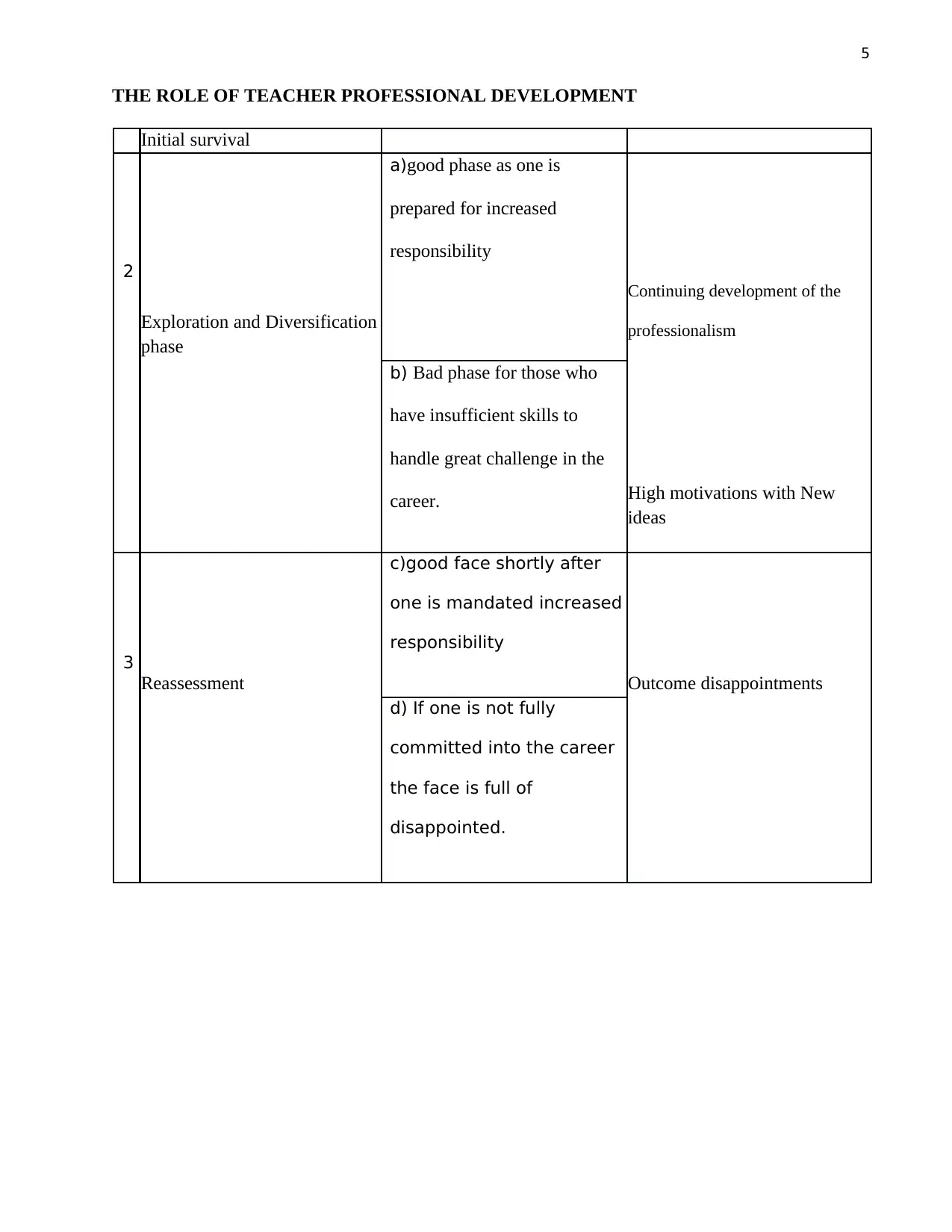
5
THE ROLE OF TEACHER PROFESSIONAL DEVELOPMENT
Initial survival
2
a)good phase as one is
prepared for increased
responsibility
Exploration and Diversification
phase
Continuing development of the
professionalism
b) Bad phase for those who
have insufficient skills to
handle great challenge in the
career. High motivations with New
ideas
3
c)good face shortly after
one is mandated increased
responsibility
Reassessment Outcome disappointments
d) If one is not fully
committed into the career
the face is full of
disappointed.
THE ROLE OF TEACHER PROFESSIONAL DEVELOPMENT
Initial survival
2
a)good phase as one is
prepared for increased
responsibility
Exploration and Diversification
phase
Continuing development of the
professionalism
b) Bad phase for those who
have insufficient skills to
handle great challenge in the
career. High motivations with New
ideas
3
c)good face shortly after
one is mandated increased
responsibility
Reassessment Outcome disappointments
d) If one is not fully
committed into the career
the face is full of
disappointed.
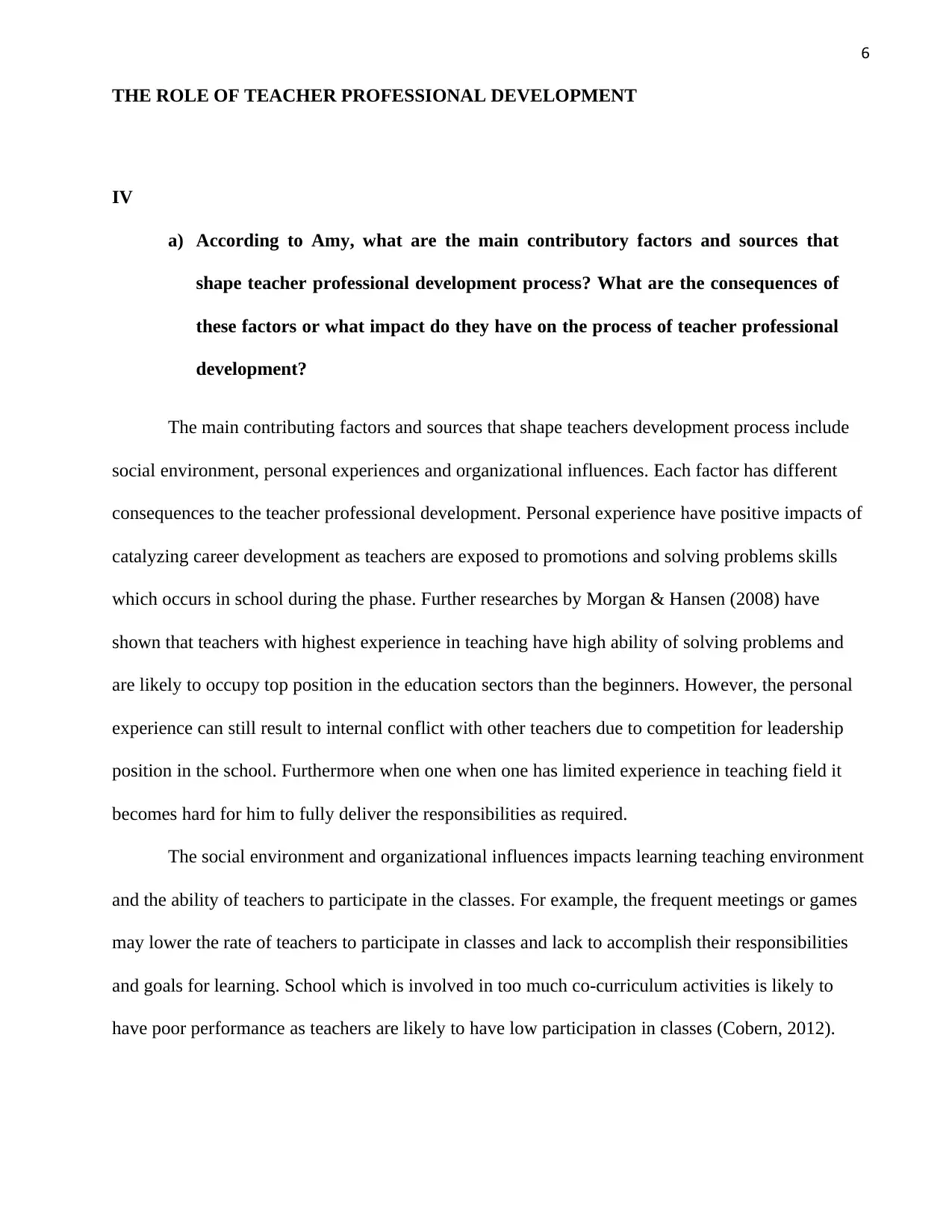
6
THE ROLE OF TEACHER PROFESSIONAL DEVELOPMENT
IV
a) According to Amy, what are the main contributory factors and sources that
shape teacher professional development process? What are the consequences of
these factors or what impact do they have on the process of teacher professional
development?
The main contributing factors and sources that shape teachers development process include
social environment, personal experiences and organizational influences. Each factor has different
consequences to the teacher professional development. Personal experience have positive impacts of
catalyzing career development as teachers are exposed to promotions and solving problems skills
which occurs in school during the phase. Further researches by Morgan & Hansen (2008) have
shown that teachers with highest experience in teaching have high ability of solving problems and
are likely to occupy top position in the education sectors than the beginners. However, the personal
experience can still result to internal conflict with other teachers due to competition for leadership
position in the school. Furthermore when one when one has limited experience in teaching field it
becomes hard for him to fully deliver the responsibilities as required.
The social environment and organizational influences impacts learning teaching environment
and the ability of teachers to participate in the classes. For example, the frequent meetings or games
may lower the rate of teachers to participate in classes and lack to accomplish their responsibilities
and goals for learning. School which is involved in too much co-curriculum activities is likely to
have poor performance as teachers are likely to have low participation in classes (Cobern, 2012).
THE ROLE OF TEACHER PROFESSIONAL DEVELOPMENT
IV
a) According to Amy, what are the main contributory factors and sources that
shape teacher professional development process? What are the consequences of
these factors or what impact do they have on the process of teacher professional
development?
The main contributing factors and sources that shape teachers development process include
social environment, personal experiences and organizational influences. Each factor has different
consequences to the teacher professional development. Personal experience have positive impacts of
catalyzing career development as teachers are exposed to promotions and solving problems skills
which occurs in school during the phase. Further researches by Morgan & Hansen (2008) have
shown that teachers with highest experience in teaching have high ability of solving problems and
are likely to occupy top position in the education sectors than the beginners. However, the personal
experience can still result to internal conflict with other teachers due to competition for leadership
position in the school. Furthermore when one when one has limited experience in teaching field it
becomes hard for him to fully deliver the responsibilities as required.
The social environment and organizational influences impacts learning teaching environment
and the ability of teachers to participate in the classes. For example, the frequent meetings or games
may lower the rate of teachers to participate in classes and lack to accomplish their responsibilities
and goals for learning. School which is involved in too much co-curriculum activities is likely to
have poor performance as teachers are likely to have low participation in classes (Cobern, 2012).
⊘ This is a preview!⊘
Do you want full access?
Subscribe today to unlock all pages.

Trusted by 1+ million students worldwide
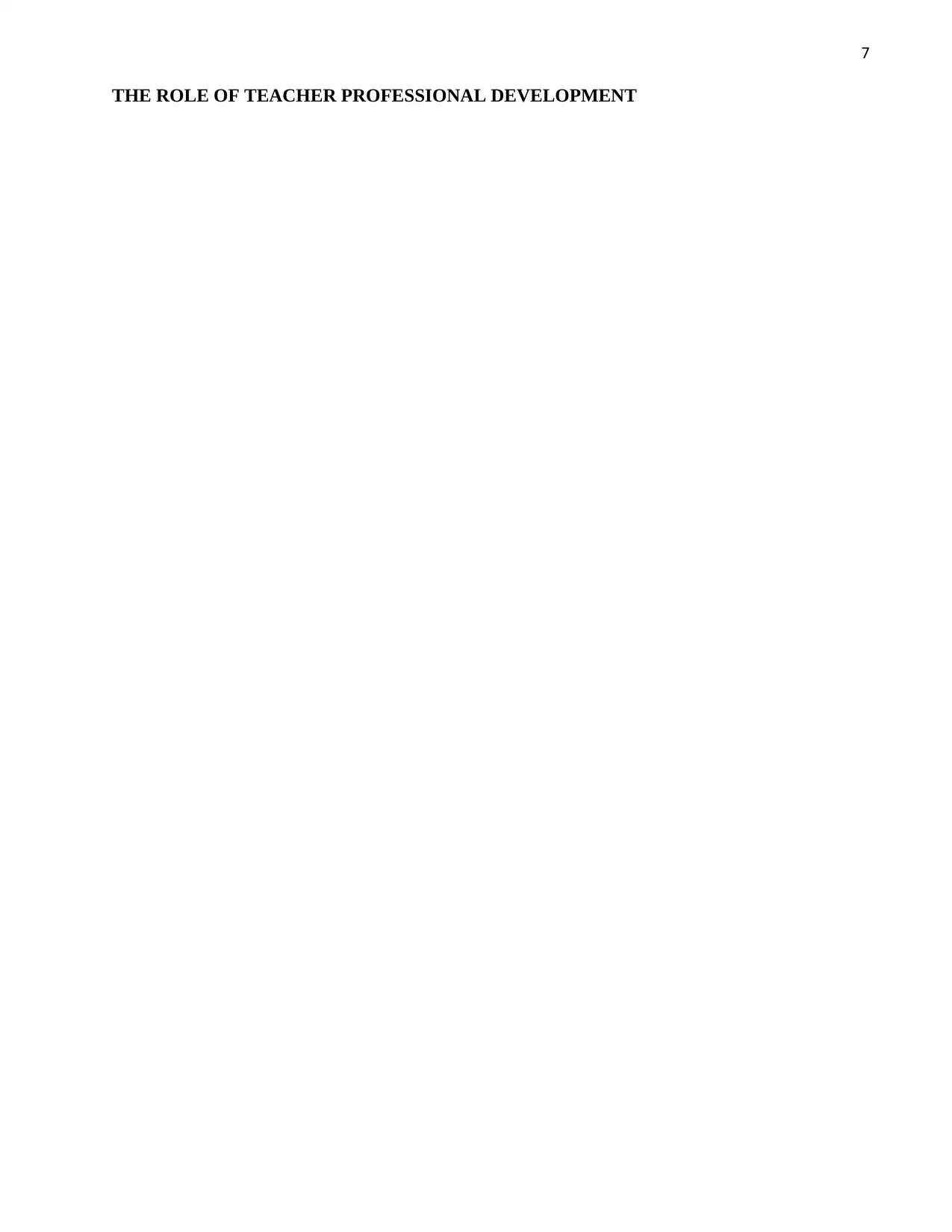
7
THE ROLE OF TEACHER PROFESSIONAL DEVELOPMENT
THE ROLE OF TEACHER PROFESSIONAL DEVELOPMENT
Paraphrase This Document
Need a fresh take? Get an instant paraphrase of this document with our AI Paraphraser
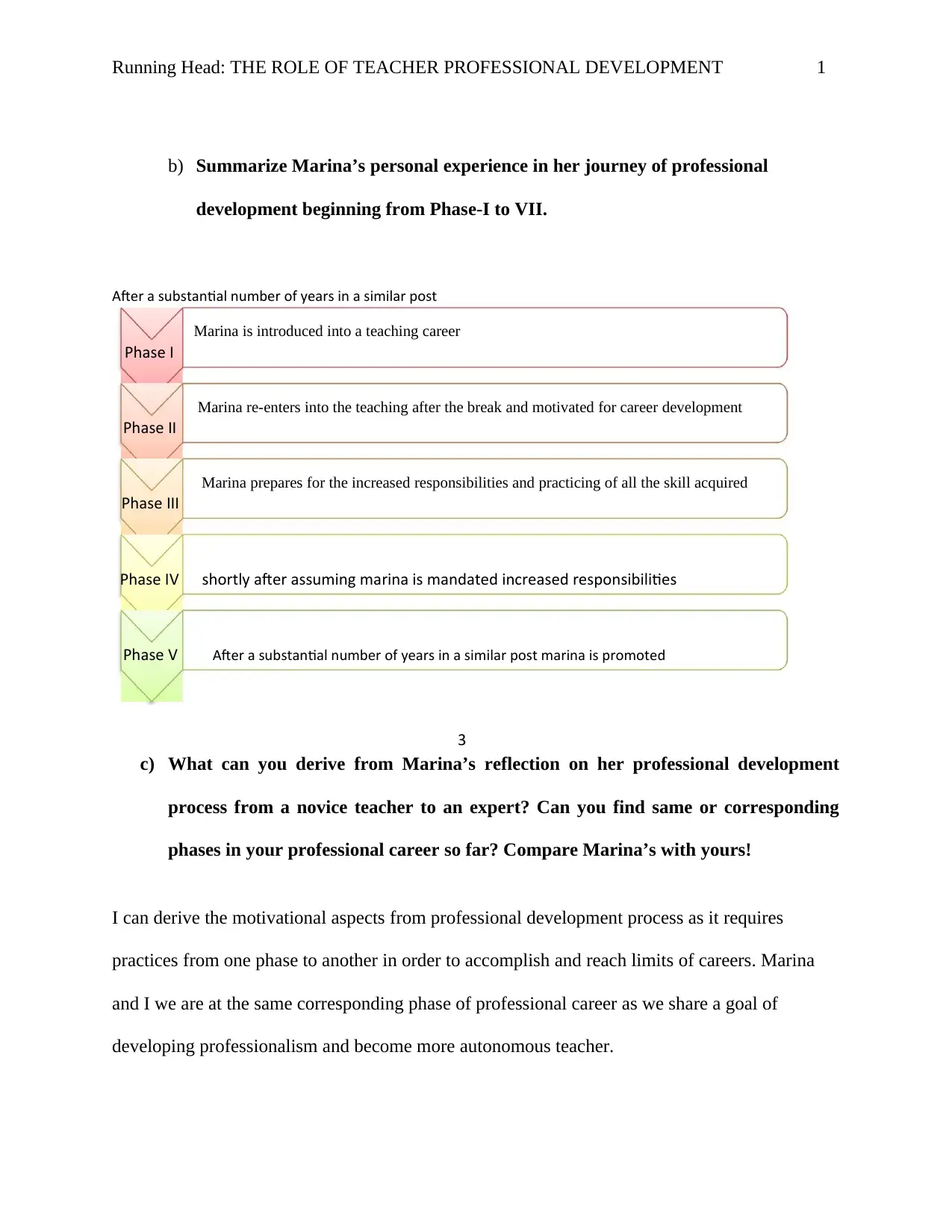
Running Head: THE ROLE OF TEACHER PROFESSIONAL DEVELOPMENT 1
b) Summarize Marina’s personal experience in her journey of professional
development beginning from Phase-I to VII.
After a substantial number of years in a similar post
Marina is introduced into a teaching career
Phase I
Marina re-enters into the teaching after the break and motivated for career development
Phase II
Marina prepares for the increased responsibilities and practicing of all the skill acquired
Phase III
Phase IV shortly after assuming marina is mandated increased responsibilities
Phase V After a substantial number of years in a similar post marina is promoted
3
c) What can you derive from Marina’s reflection on her professional development
process from a novice teacher to an expert? Can you find same or corresponding
phases in your professional career so far? Compare Marina’s with yours!
I can derive the motivational aspects from professional development process as it requires
practices from one phase to another in order to accomplish and reach limits of careers. Marina
and I we are at the same corresponding phase of professional career as we share a goal of
developing professionalism and become more autonomous teacher.
b) Summarize Marina’s personal experience in her journey of professional
development beginning from Phase-I to VII.
After a substantial number of years in a similar post
Marina is introduced into a teaching career
Phase I
Marina re-enters into the teaching after the break and motivated for career development
Phase II
Marina prepares for the increased responsibilities and practicing of all the skill acquired
Phase III
Phase IV shortly after assuming marina is mandated increased responsibilities
Phase V After a substantial number of years in a similar post marina is promoted
3
c) What can you derive from Marina’s reflection on her professional development
process from a novice teacher to an expert? Can you find same or corresponding
phases in your professional career so far? Compare Marina’s with yours!
I can derive the motivational aspects from professional development process as it requires
practices from one phase to another in order to accomplish and reach limits of careers. Marina
and I we are at the same corresponding phase of professional career as we share a goal of
developing professionalism and become more autonomous teacher.
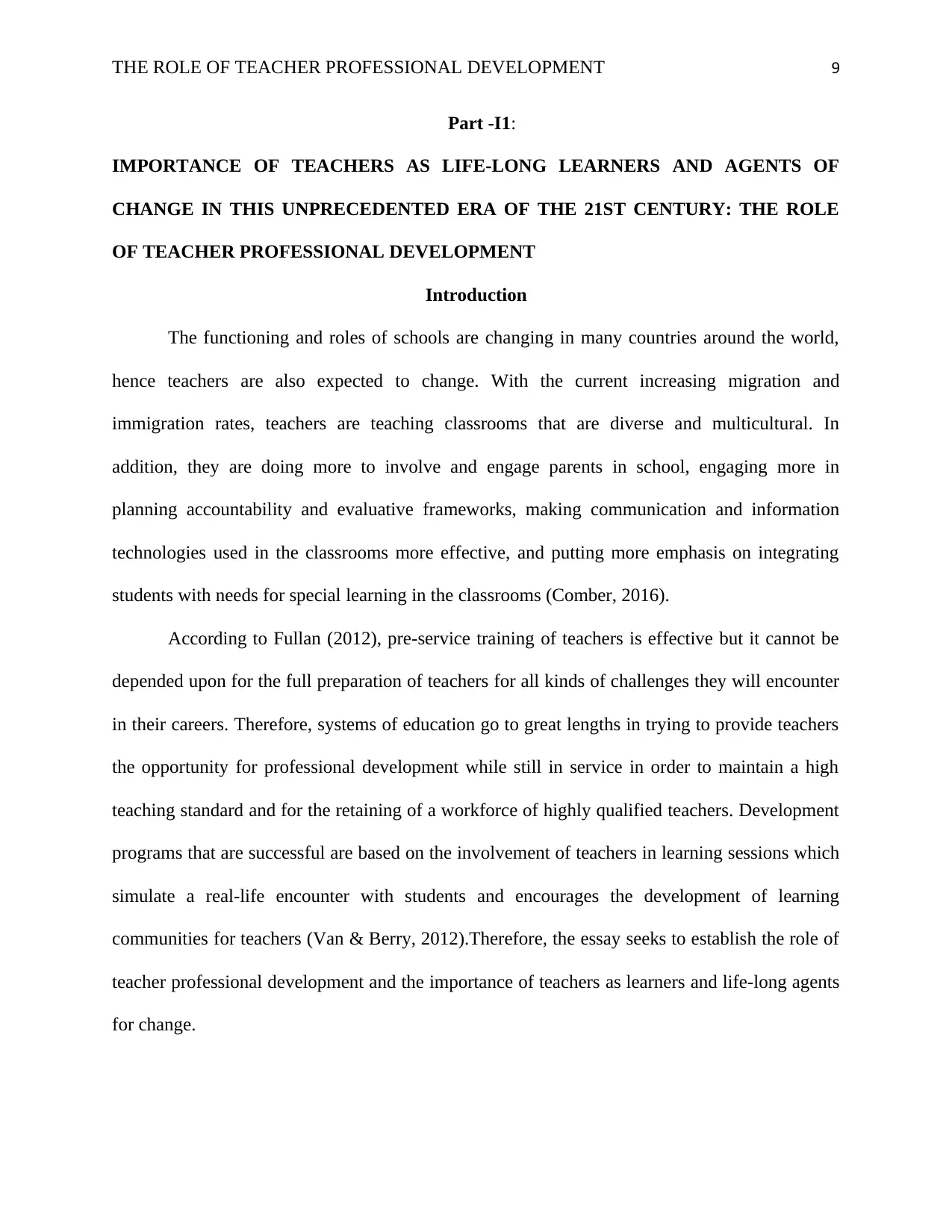
THE ROLE OF TEACHER PROFESSIONAL DEVELOPMENT 9
Part -I1:
IMPORTANCE OF TEACHERS AS LIFE-LONG LEARNERS AND AGENTS OF
CHANGE IN THIS UNPRECEDENTED ERA OF THE 21ST CENTURY: THE ROLE
OF TEACHER PROFESSIONAL DEVELOPMENT
Introduction
The functioning and roles of schools are changing in many countries around the world,
hence teachers are also expected to change. With the current increasing migration and
immigration rates, teachers are teaching classrooms that are diverse and multicultural. In
addition, they are doing more to involve and engage parents in school, engaging more in
planning accountability and evaluative frameworks, making communication and information
technologies used in the classrooms more effective, and putting more emphasis on integrating
students with needs for special learning in the classrooms (Comber, 2016).
According to Fullan (2012), pre-service training of teachers is effective but it cannot be
depended upon for the full preparation of teachers for all kinds of challenges they will encounter
in their careers. Therefore, systems of education go to great lengths in trying to provide teachers
the opportunity for professional development while still in service in order to maintain a high
teaching standard and for the retaining of a workforce of highly qualified teachers. Development
programs that are successful are based on the involvement of teachers in learning sessions which
simulate a real-life encounter with students and encourages the development of learning
communities for teachers (Van & Berry, 2012).Therefore, the essay seeks to establish the role of
teacher professional development and the importance of teachers as learners and life-long agents
for change.
Part -I1:
IMPORTANCE OF TEACHERS AS LIFE-LONG LEARNERS AND AGENTS OF
CHANGE IN THIS UNPRECEDENTED ERA OF THE 21ST CENTURY: THE ROLE
OF TEACHER PROFESSIONAL DEVELOPMENT
Introduction
The functioning and roles of schools are changing in many countries around the world,
hence teachers are also expected to change. With the current increasing migration and
immigration rates, teachers are teaching classrooms that are diverse and multicultural. In
addition, they are doing more to involve and engage parents in school, engaging more in
planning accountability and evaluative frameworks, making communication and information
technologies used in the classrooms more effective, and putting more emphasis on integrating
students with needs for special learning in the classrooms (Comber, 2016).
According to Fullan (2012), pre-service training of teachers is effective but it cannot be
depended upon for the full preparation of teachers for all kinds of challenges they will encounter
in their careers. Therefore, systems of education go to great lengths in trying to provide teachers
the opportunity for professional development while still in service in order to maintain a high
teaching standard and for the retaining of a workforce of highly qualified teachers. Development
programs that are successful are based on the involvement of teachers in learning sessions which
simulate a real-life encounter with students and encourages the development of learning
communities for teachers (Van & Berry, 2012).Therefore, the essay seeks to establish the role of
teacher professional development and the importance of teachers as learners and life-long agents
for change.
⊘ This is a preview!⊘
Do you want full access?
Subscribe today to unlock all pages.

Trusted by 1+ million students worldwide
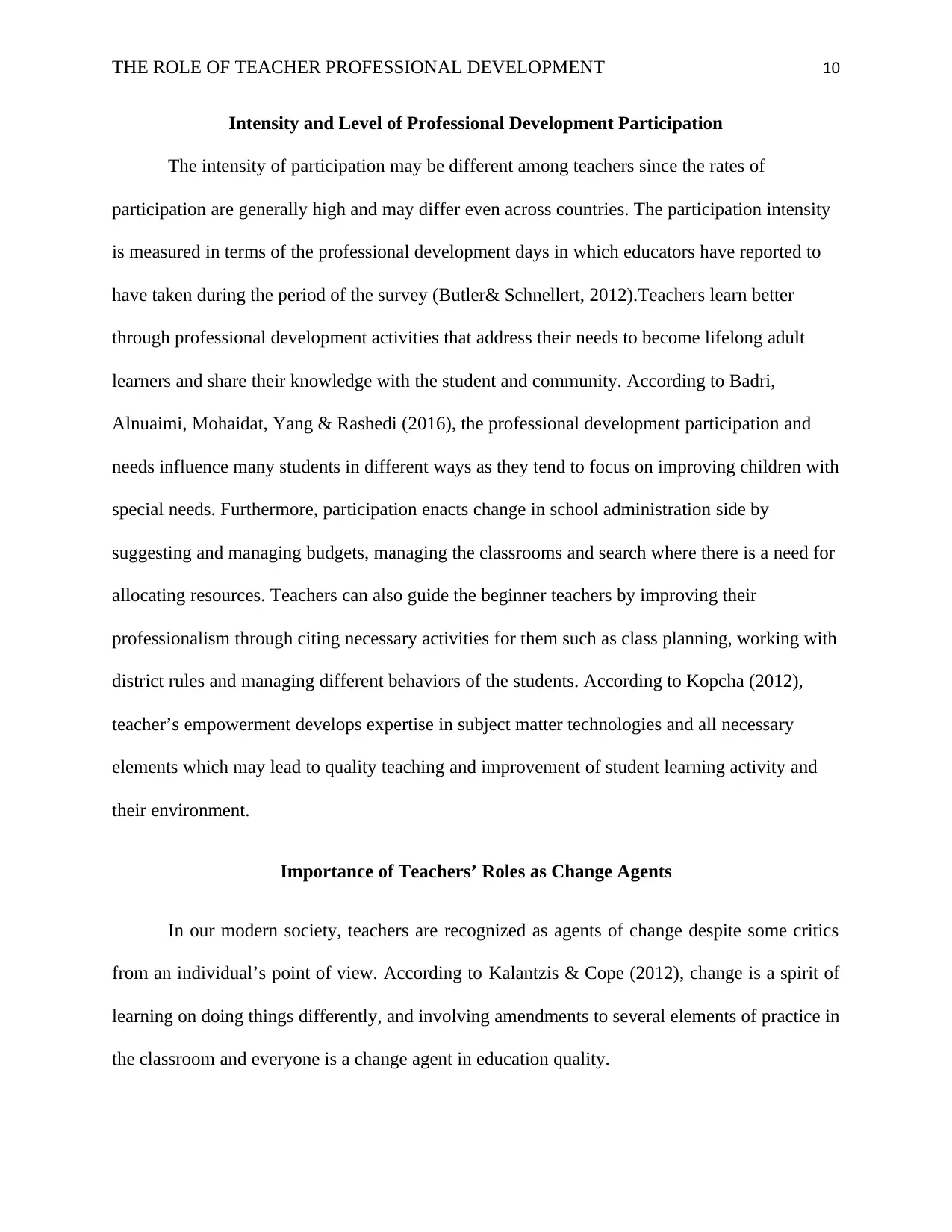
THE ROLE OF TEACHER PROFESSIONAL DEVELOPMENT 10
Intensity and Level of Professional Development Participation
The intensity of participation may be different among teachers since the rates of
participation are generally high and may differ even across countries. The participation intensity
is measured in terms of the professional development days in which educators have reported to
have taken during the period of the survey (Butler& Schnellert, 2012).Teachers learn better
through professional development activities that address their needs to become lifelong adult
learners and share their knowledge with the student and community. According to Badri,
Alnuaimi, Mohaidat, Yang & Rashedi (2016), the professional development participation and
needs influence many students in different ways as they tend to focus on improving children with
special needs. Furthermore, participation enacts change in school administration side by
suggesting and managing budgets, managing the classrooms and search where there is a need for
allocating resources. Teachers can also guide the beginner teachers by improving their
professionalism through citing necessary activities for them such as class planning, working with
district rules and managing different behaviors of the students. According to Kopcha (2012),
teacher’s empowerment develops expertise in subject matter technologies and all necessary
elements which may lead to quality teaching and improvement of student learning activity and
their environment.
Importance of Teachers’ Roles as Change Agents
In our modern society, teachers are recognized as agents of change despite some critics
from an individual’s point of view. According to Kalantzis & Cope (2012), change is a spirit of
learning on doing things differently, and involving amendments to several elements of practice in
the classroom and everyone is a change agent in education quality.
Intensity and Level of Professional Development Participation
The intensity of participation may be different among teachers since the rates of
participation are generally high and may differ even across countries. The participation intensity
is measured in terms of the professional development days in which educators have reported to
have taken during the period of the survey (Butler& Schnellert, 2012).Teachers learn better
through professional development activities that address their needs to become lifelong adult
learners and share their knowledge with the student and community. According to Badri,
Alnuaimi, Mohaidat, Yang & Rashedi (2016), the professional development participation and
needs influence many students in different ways as they tend to focus on improving children with
special needs. Furthermore, participation enacts change in school administration side by
suggesting and managing budgets, managing the classrooms and search where there is a need for
allocating resources. Teachers can also guide the beginner teachers by improving their
professionalism through citing necessary activities for them such as class planning, working with
district rules and managing different behaviors of the students. According to Kopcha (2012),
teacher’s empowerment develops expertise in subject matter technologies and all necessary
elements which may lead to quality teaching and improvement of student learning activity and
their environment.
Importance of Teachers’ Roles as Change Agents
In our modern society, teachers are recognized as agents of change despite some critics
from an individual’s point of view. According to Kalantzis & Cope (2012), change is a spirit of
learning on doing things differently, and involving amendments to several elements of practice in
the classroom and everyone is a change agent in education quality.
Paraphrase This Document
Need a fresh take? Get an instant paraphrase of this document with our AI Paraphraser
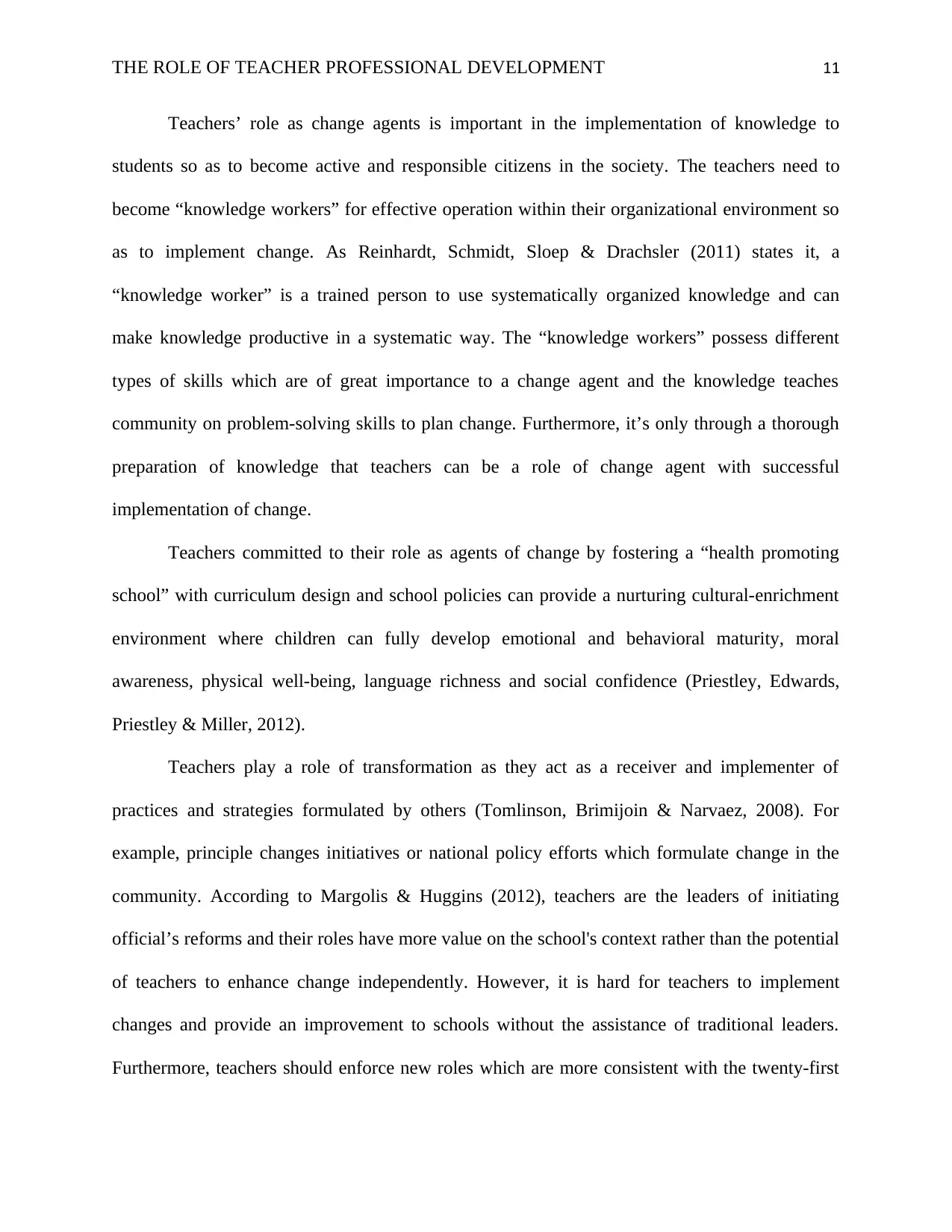
THE ROLE OF TEACHER PROFESSIONAL DEVELOPMENT 11
Teachers’ role as change agents is important in the implementation of knowledge to
students so as to become active and responsible citizens in the society. The teachers need to
become “knowledge workers” for effective operation within their organizational environment so
as to implement change. As Reinhardt, Schmidt, Sloep & Drachsler (2011) states it, a
“knowledge worker” is a trained person to use systematically organized knowledge and can
make knowledge productive in a systematic way. The “knowledge workers” possess different
types of skills which are of great importance to a change agent and the knowledge teaches
community on problem-solving skills to plan change. Furthermore, it’s only through a thorough
preparation of knowledge that teachers can be a role of change agent with successful
implementation of change.
Teachers committed to their role as agents of change by fostering a “health promoting
school” with curriculum design and school policies can provide a nurturing cultural-enrichment
environment where children can fully develop emotional and behavioral maturity, moral
awareness, physical well-being, language richness and social confidence (Priestley, Edwards,
Priestley & Miller, 2012).
Teachers play a role of transformation as they act as a receiver and implementer of
practices and strategies formulated by others (Tomlinson, Brimijoin & Narvaez, 2008). For
example, principle changes initiatives or national policy efforts which formulate change in the
community. According to Margolis & Huggins (2012), teachers are the leaders of initiating
official’s reforms and their roles have more value on the school's context rather than the potential
of teachers to enhance change independently. However, it is hard for teachers to implement
changes and provide an improvement to schools without the assistance of traditional leaders.
Furthermore, teachers should enforce new roles which are more consistent with the twenty-first
Teachers’ role as change agents is important in the implementation of knowledge to
students so as to become active and responsible citizens in the society. The teachers need to
become “knowledge workers” for effective operation within their organizational environment so
as to implement change. As Reinhardt, Schmidt, Sloep & Drachsler (2011) states it, a
“knowledge worker” is a trained person to use systematically organized knowledge and can
make knowledge productive in a systematic way. The “knowledge workers” possess different
types of skills which are of great importance to a change agent and the knowledge teaches
community on problem-solving skills to plan change. Furthermore, it’s only through a thorough
preparation of knowledge that teachers can be a role of change agent with successful
implementation of change.
Teachers committed to their role as agents of change by fostering a “health promoting
school” with curriculum design and school policies can provide a nurturing cultural-enrichment
environment where children can fully develop emotional and behavioral maturity, moral
awareness, physical well-being, language richness and social confidence (Priestley, Edwards,
Priestley & Miller, 2012).
Teachers play a role of transformation as they act as a receiver and implementer of
practices and strategies formulated by others (Tomlinson, Brimijoin & Narvaez, 2008). For
example, principle changes initiatives or national policy efforts which formulate change in the
community. According to Margolis & Huggins (2012), teachers are the leaders of initiating
official’s reforms and their roles have more value on the school's context rather than the potential
of teachers to enhance change independently. However, it is hard for teachers to implement
changes and provide an improvement to schools without the assistance of traditional leaders.
Furthermore, teachers should enforce new roles which are more consistent with the twenty-first
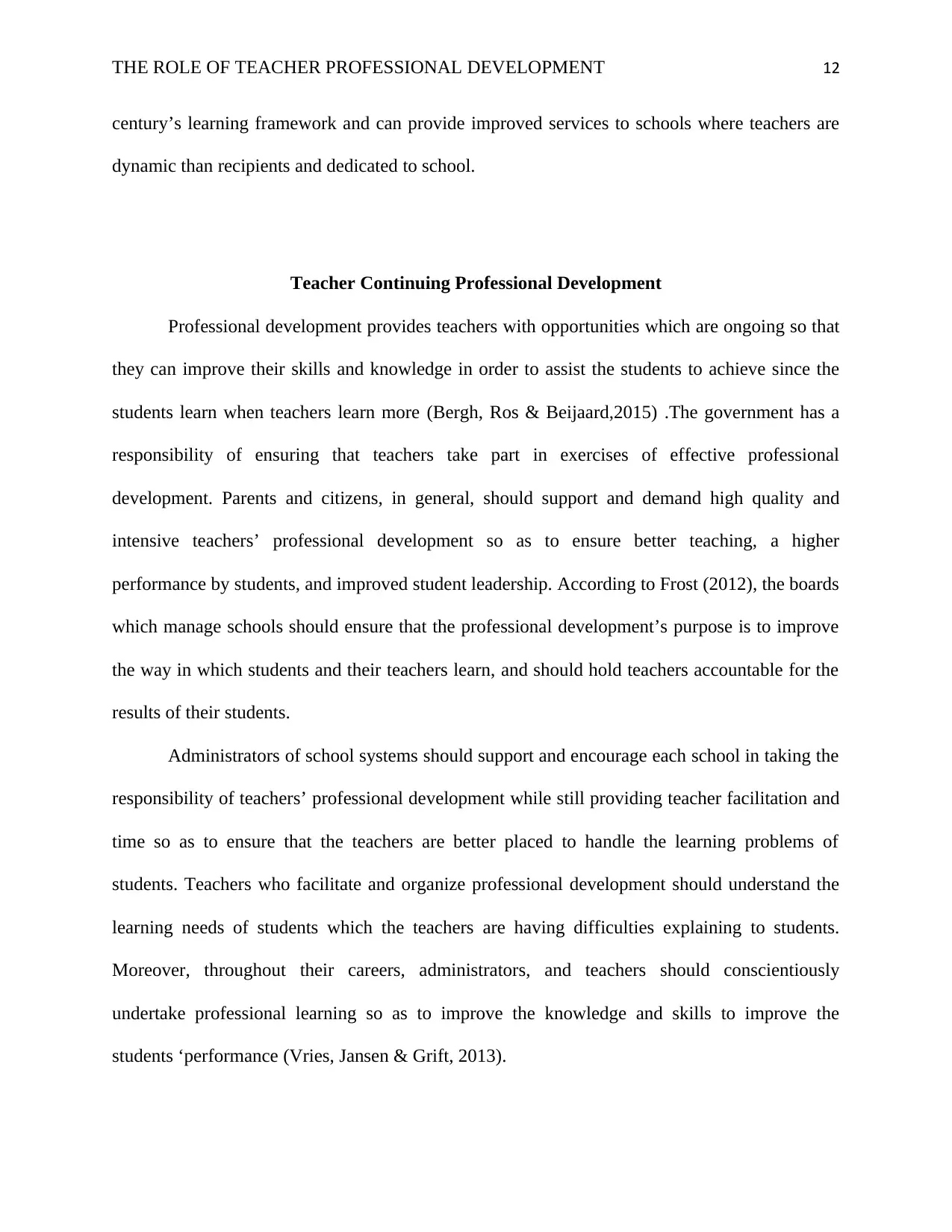
THE ROLE OF TEACHER PROFESSIONAL DEVELOPMENT 12
century’s learning framework and can provide improved services to schools where teachers are
dynamic than recipients and dedicated to school.
Teacher Continuing Professional Development
Professional development provides teachers with opportunities which are ongoing so that
they can improve their skills and knowledge in order to assist the students to achieve since the
students learn when teachers learn more (Bergh, Ros & Beijaard,2015) .The government has a
responsibility of ensuring that teachers take part in exercises of effective professional
development. Parents and citizens, in general, should support and demand high quality and
intensive teachers’ professional development so as to ensure better teaching, a higher
performance by students, and improved student leadership. According to Frost (2012), the boards
which manage schools should ensure that the professional development’s purpose is to improve
the way in which students and their teachers learn, and should hold teachers accountable for the
results of their students.
Administrators of school systems should support and encourage each school in taking the
responsibility of teachers’ professional development while still providing teacher facilitation and
time so as to ensure that the teachers are better placed to handle the learning problems of
students. Teachers who facilitate and organize professional development should understand the
learning needs of students which the teachers are having difficulties explaining to students.
Moreover, throughout their careers, administrators, and teachers should conscientiously
undertake professional learning so as to improve the knowledge and skills to improve the
students ‘performance (Vries, Jansen & Grift, 2013).
century’s learning framework and can provide improved services to schools where teachers are
dynamic than recipients and dedicated to school.
Teacher Continuing Professional Development
Professional development provides teachers with opportunities which are ongoing so that
they can improve their skills and knowledge in order to assist the students to achieve since the
students learn when teachers learn more (Bergh, Ros & Beijaard,2015) .The government has a
responsibility of ensuring that teachers take part in exercises of effective professional
development. Parents and citizens, in general, should support and demand high quality and
intensive teachers’ professional development so as to ensure better teaching, a higher
performance by students, and improved student leadership. According to Frost (2012), the boards
which manage schools should ensure that the professional development’s purpose is to improve
the way in which students and their teachers learn, and should hold teachers accountable for the
results of their students.
Administrators of school systems should support and encourage each school in taking the
responsibility of teachers’ professional development while still providing teacher facilitation and
time so as to ensure that the teachers are better placed to handle the learning problems of
students. Teachers who facilitate and organize professional development should understand the
learning needs of students which the teachers are having difficulties explaining to students.
Moreover, throughout their careers, administrators, and teachers should conscientiously
undertake professional learning so as to improve the knowledge and skills to improve the
students ‘performance (Vries, Jansen & Grift, 2013).
⊘ This is a preview!⊘
Do you want full access?
Subscribe today to unlock all pages.

Trusted by 1+ million students worldwide
1 out of 18
Related Documents
Your All-in-One AI-Powered Toolkit for Academic Success.
+13062052269
info@desklib.com
Available 24*7 on WhatsApp / Email
![[object Object]](/_next/static/media/star-bottom.7253800d.svg)
Unlock your academic potential
Copyright © 2020–2026 A2Z Services. All Rights Reserved. Developed and managed by ZUCOL.




